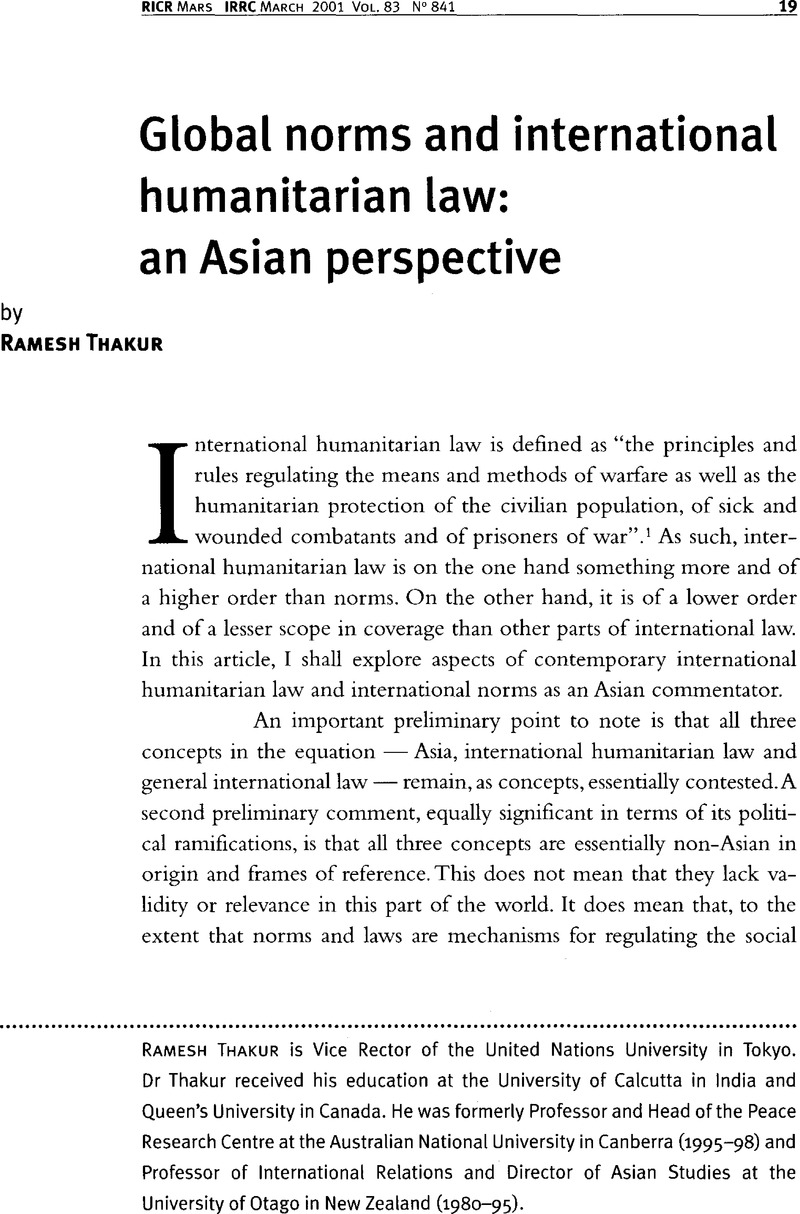Article contents
Global norms and international humanitarian law: an Asian perspective
Published online by Cambridge University Press: 19 April 2010
Abstract

- Type
- Research Article
- Information
- Copyright
- Copyright © International Committee of the Red Cross 2001
References
1 Basic Facts about the United Nations, United Nations, New York, 1998, pp. 267–268.
2 For yet another recent documentation of this, see Aydinti, Ersel and Mathews, Julie, “Are the core and periphery irreconcilable? The curious world of publishing in contemporary international relations”, International Studies Perspectives, December 2000, pp. 289–303.CrossRefGoogle Scholar
3 This subsection is adapted from Thakur, Ramesh and Maley, William, “The Ottawa Convention on landmines: A landmark humanitarian treaty in arms control?”, Global Governance, July-September 1999, pp. 275–277.Google Scholar
4 The classic statement of the apparent paradox remains that of Bull, Hedley, The Anarchical Society: A Study of Order in World Politics, Macmillan, London, 1977.CrossRefGoogle Scholar
5 See Walzer, Michael, Just and Unjust Wars: A Moral Argument with Historical Illustrations, Basic Books, New York, 1992Google Scholar, and Best, Geoffrey, Humanity in Warfare: The Modern History of the International Law of Armed Conflicts, Weidenfeld & Nicolson, London, 1983.Google Scholar
6 Dunant, Henry, A Memory of Solferino, ICRC, Geneva, 1986.Google Scholar
7 Kalshoven, Frits, Constraints on the Waging of War, ICRC, Geneva, 1991, pp. 8–18.Google Scholar There is, of course, a significant overlapping of these streams; see Best, Geoffrey, War and Lawsince 1945, Oxford University Press, 1994, pp. 183–184.Google Scholar
8 For a compilation of relevant instruments, see Roberts, Adam and Guelff, Richard (eds), Documents on the Laws of Wat, 3rd ed., Oxford University Press, 2000.Google Scholar
9 See the views of the majority of the International Court of Justice in Legality of the Threat or Use of Nuclear Weapons, Advisory Opinion, I.C.J. Reports 1996, p. 226, and 35 ILM 814.
10 Falk, Richard A., The Status of Law in International Society, Princeton University Press, 1970, p. 177.Google Scholar
11 Szasz, Paul C., “General law-making processes”, in Joyner, Christopher C. (ed.), The United Nations and International Law, Cambridge University Press, 1997, pp. 32–33.Google Scholar
12 Greig, Donald W., “Sources of international law”, in Blay, Sam, Piotrowicz, Ryszard and Martin Tsamenyi, B. (eds), Public International Law: an Australian Perspective, Oxford University Press, Melbourne, 1997, p. 86.Google Scholar
13 Jan Linehan, “The law of treaties”, ibid., p. 107.
14 Op. cit. (note 3), pp. 273–302.
15 Convention on the Prohibition of the Use, Stockpiling, Production and Transfer of Anti-personnel Mines and on their Destruction, 18 September 1997.
16 I had the privilege of chairing the four-day conference in Sydney.
17 International Convention on Economic, Social and Cultural Rights, and International Convention on Civil and Political Rights, both of 16 December 1966.
18 Nelson Mandela notes in his autobiography, for instance, that sanctions were the best lever to force changes on South Africa's apartheid regime, and even in the early 1990s he was still urging the US Congress not to loosen US sanctions as favoured by the Bush Administration; Mandela, Nelson, Long Walk to Freedom, 1994, paperback ed., Abacus, pp. 697–699.Google Scholar He was unhappy that “[e]ven during the bleakest years on Robben Island, Amnesty International would not campaign for us on the ground that we had pursued an armed struggle”. Ibid., p. 734.
19 Rome Statute of the International Criminal Court, 17 July 1998.
20 For a discussion of the origins, evolution and limitations of geographical representation in the United Nations, see Thakur, Ramesh (ed.), What is Equitable Geographic Representation in the Twenty-first Century?, United Nations University, Tokyo, 1999.Google Scholar
21 The seat of Europe today is Brussels. For a recent account of the scale of humanitarian atrocities committed by Belgium in its African colony, see Hochschild, Adam, King Leopold's Ghost, Houghton Mifflin, Boston, 1999.Google Scholar
22 Bringing Them Home: Report of the National Inquiry into the Separation of Aboriginal and Torres Strait Islander Children from Their Families, Human Rights and Equal Opportunity Commission, Sydney, 1997.
23 See Saikal, Amin, “Afghans are mistreated in Australia”, International Herald Tribune, 4 January 2001.Google Scholar
24 Inis L. Claude, “The evolution of concepts of global governance and the State in the twentieth century”, paper delivered at the annual conference of the Academic Council on the United Nations System (ACUNS), Oslo, 16–18 June 2000. Claude does note, however, that the new norm “has been no less challenged in principle and dishonored in practice than was the old norm of non-intervention”.
25 Mueller, John and Mueller, Karl, “Sanctions of mass destruction”, Foreign Affairs, May/June 1999, pp. 43–53.CrossRefGoogle Scholar
26 See Gordon, Joy, “A peaceful, silent, deadly remedy: The ethics of economic sanctions”, Ethics & International Affairs, Vol. 13, 1999, pp. 123–142Google Scholar; Christiansen, Drew and Powers, Gerard F., “Economic sanctions and just-war doctrine”, in Cortright, David and Lopez, George A. (eds), Economic Sanctions: Panacea or Peacebuilding in a Post-Cold War World, Westview, Boulder, 1995, pp. 97–120Google Scholar; Pierce, Albert C., “Just war principles and economic sanctions”, Ethics & International Affairs, Vol. 10, 1996, pp. 99–113Google Scholar; and Winkler, Adam, “Just sanctions”, Human Rights Quarterly, Vol. 21, 1999, pp. 133–155.Google Scholar
27 These issues are explored in full detail in Schnabel, Albrecht and Thakur, Ramesh (eds), Kosovo and the Challenge of Humanitarian Intervention: Selective Indignation, Collective Action, and International Citizenship, United Nations University Press, Tokyo, 2000.Google Scholar
- 23
- Cited by




